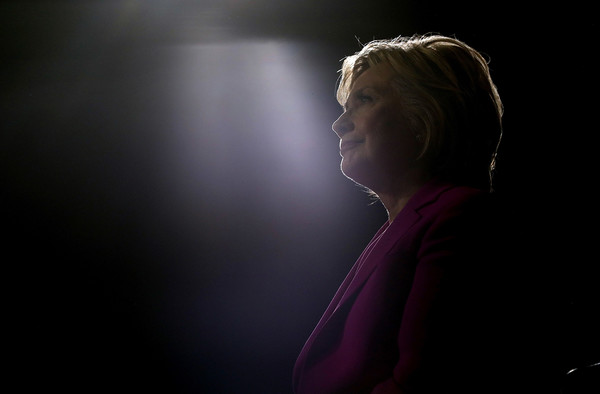Hillary for America Statement on FBI Director Comey’s Testimony Before House Committee
Hillary for America National Press Secretary Brian Fallon released the following statement Thursday following FBI Director James Comey’s appearance before the House Oversight and Government Reform Committee: “Despite the partisan motivations of this hearing, we are glad it took place and that Director Comey had the opportunity to expand upon his remarks from earlier this week. Director Comey’s testimony clearly knocked down a number of false Republican talking points and reconciled apparent contradictions between his previous remarks and Hillary Clinton’s public statements. The Director’s explanations shut the door on any remaining conspiracy theories once and for all. While Republicans may try to keep this issue alive, this hearing proved those efforts will only backfire.”
The Republicans on that committee have been gunning for Hillary Clinton for years. Time and again they have proven themselves to be the gang that couldn't shoot straight.
15 Facts From Comey
FBI Director’s Testimony Backs Up Clinton, Debunks Republican Conspiracy Theories
Today, House Republicans brought FBI Director James Comey in to testify – after the conclusion of a year-long investigation – in hopes of uncovering new details to damage Hillary Clinton. Instead, Comey’s testimony only debunked GOP talking points and further substantiated Clinton’s case.
Here are 15 key takeaways:
MATT CARTWRIGHT: I don't think you were given a full chance to talk about those three documents with the little ‘C’s’ on them. Were they properly documented? Were they properly marked according to the manual? COMEY: No.
- Emails reported as "marked classified" were improperly marked.
MATT CARTWRIGHT: If Secretary Clinton were an expert about what's classified and not classified and we're following the manual, the absence of a header would tell her immediately that those three documents were not classified. Am I correct in that? | COMEY: That would be a reasonable inference.
- And those emails could be reasonably judged as not classified.
COMEY: There is in my view not evidence beyond certainly probable cause, not evidence beyond a reasonable doubt she knew she was receiving classified information or she intended to retain it on her server.
- There’s no evidence Clinton ever knew she had received classified information or intended to retain it on her server.
BLAKE FARENTHOLD: And [Guccifer] claimed he gained access to Sid Blumenthal's e-mail account and traced him back to Secretary Clinton's private server. Can you confirm that Guccifer never gained access to her server. | COMEY: He admitted that was a lie.
- Guccifer admitted his claim he had hacked Clinton’s server was a lie.
COMEY: We were not able to conclude [any hacking attempts] were successful.
- And there is no evidence that Clinton’s server has ever been successfully hacked.
COMEY: "They didn't influence it in any way."
- The FBI’s investigation was not influenced by outside officials.
COMEY: The Petraeus case to my mind illustrates perfectly the kind of cases the Department of Justice is willing to prosecute. Even there, they prosecuted him for a misdemeanor. In that case, you had vast quantities of highly classified information, including special sensitive compartmented information, that's the reference to code words. Vast quantity of it not only shared with someone without authority to have it but we found it in a search warrant hidden under the insulation in his attic and then he lied to us about it during the investigation. So you have obstruction of justice, you have intentional misconduct, and a vast quantity of information. He admitted he knew that was the wrong thing to do. That is a perfect illustration of the kind of cases that get prosecuted. In my mind, it illustrates importantly the distinction to this case.
- Clinton’s case is nothing like the case of General David Petraeus.
COMEY: The Deutch case illustrates [the difference between Clinton’s case and others who were prosecuted] perfectly. I mean he took huge amount of documents. Almost all at the TSSC I level. Had them in hard copy in his house, had them on an unclassified system connected to the internet, attempted to destroy some when he got caught. Admitted I knew I wasn't supposed to be doing this. You have clear intent, huge amounts of documents, obstruction of justice. Those are the kinds of cases that get prosecuted. That's what I said. I meant it when I said it. In my experience which is three decades no reasonable prosecutor would bring this case. I know that frustrates people but that's the way the law is and that's the way the practice is at the Department of Justice.
- Clinton’s case is nothing like the case of CIA Director John Deutch.
9. Clinton’s case is nothing like the case of Navy Commander Bryan Nishimura
COMEY: Nishimura was prosecuted under the misdemeanor statute 1924 on facts that are very different. If you want me to go through them, I'll go through them but they are very different.
WILL HURD: Was this unanimous opinion within the FBI on your decision? | COMEY: Well the whole F.B.I. wasn't involved but the team of agents, investigators, analysts, technologists — yes.
- The FBI’s conclusion that there was no case against Clinton was unanimous.
COMEY: Our best information is she set it up as a matter of convenience. It was an already existing system that her husband had and she decided to have a domain on that system.
- Clinton’s email setup was, as she has always said, a matter of convenience.
JIM JORDAN: Did Secretary Clinton know her legal team deleted those emails they kept from us? | COMEY: I don't believe so. | JORDAN: Did Secretary Clinton approve those emails being deleted? | COMEY: I don't think there was any specific instruction or conversation between the Secretary and her lawyers about that. | JORDAN: Did you ask that question? | COMEY: Yes. | JORDAN: Did Secretary Clinton know her lawyers cleaned devices in such a way as to preclude forensic discovery? | COMEY: I don't think she did. | JORDAN: Did you ask that question? | COMEY: Yes.
- Clinton did not instruct lawyers who performed the sorting of her emails.
COMEY: We have no basis to conclude she lied to the FBI.
- Hillary Clinton did not lie to the FBI.
COMEY: I don't think the [FBI] agents assessed she was evasive [in their 3.5 hour interview with Hillary Clinton.]
- Clinton was not even evasive with the FBI.
COMEY: There's all kinds of folks watching this at home who are being told, ‘well, lots of other cases were prosecuted and she wasn't.’ I want them to know, that's not true!
- There is no truth to the idea that others are prosecuted for what Clinton did.
I remember that October 10, 2012 session so well. Chaffetz and the Republicans were lording it over the Dems on the committee because they had gone on a junket to Libya that they not only did not invite the Dems to, they didn't even tell them they were going. Showing off for having been there, Chaffetz made a big scene when an aerial photo of "the annex" was shown. He started saying that when he was there he was told never, never to discuss that building, and, in his flash of hubris, the world knew that "the annex" was actually a CIA operations base. In exposing that information, Chaffetz clumsily shot himself and his party in the foot. Their incessant cry asking why the Benghazi consulate remained open when other consulates had closed was answered with three letters. There was also an active CIA operation in Benghazi.Flashback: Chaffetz and Gowdy Disclosed Sensitive Information, Outed a CIA Source
Chaffetz Flagrantly Used Personal Email
On Multiple Occasions, Chaffetz Inappropriately Disclosed Sensitive Information
Perusing the #ComeyHearing on Twitter, I saw Watergate come up in a few tweets. To be clear, the only commonality between Watergate and this Benghazi come emails come server expedition is this: both the break-in at the DNC Watergate headquarters and the Republican Oversight Committee fishing expedition were Republican efforts to influence a presidential election.




